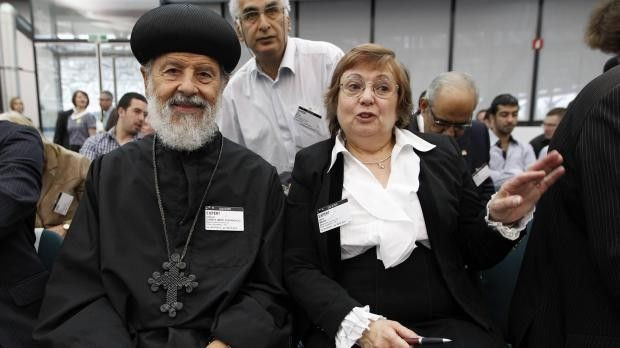Fired For Being Christian? Religious Employees Have Their Day In Court

The European Court of Human Rights on Tuesday held a public hearing on four separate cases involving British Christians who claim they lost their jobs or were disciplined because of their religious beliefs.
The landmark hearing -- which took place in Strasbourg, France, in front of a chamber of judges from nine European nations -- follows six years of legal battles and tribunals for the four plaintiffs, whose high-profile cases are seen as a polarizing dividing line between British Christians who want to express their faith in the workplace and employers who assert their right to impose dress codes and guidelines for workplace conduct.
According to a press release issued by the court's registrar, the cases include that of Nadia Eweida, a British Airways check-in clerk who in 2006 was told she could not wear a small cross around her neck with her uniform. Eweida was sent home without pay when she refused to remove the cross, according to the court. However, following a spate of news reports on the incident, the airline reversed its policy in early 2007, and Eweida was permitted to return to work.
"We accepted the arguments put to us at the time and amended the uniform policy accordingly," a British Airways spokesperson told IBTimes. "The company reviewed its uniform rules for staff to wear a symbol of faith openly."
Eweida has since tried to recoup back pay for her time off, but she lost an employment tribunal and an appeal. She is still seeking back pay in Tuesday's court hearing.
Similar to Eweida's case is the complaint of Shirley Chaplin, a nurse at the Royal Devon & Exeter Hospital, who was also asked to remove a crucifix at work. Chaplain said that when she refused, she was subsequently "moved to a non-nursing temporary position," which ceased to exist in July 2010.
The third plaintive in the hearing is Lilian Ladele, a registrar for the London Borough of Islington, who was disciplined after she refused to conduct same-sex civil unions in accordance with the U.K.'s Civil Partnership Act of 2005. Similarly, Gary McFarlane, a counselor for the couples-therapy service Relate Avon, said he was fired after he objected to giving sex-therapy advice to gay couples.
According to the court, "Both Ms. Ladele and Mr. McFarlane are Christians who believe that homosexual relationships are contrary to God's law and that it is incompatible with their beliefs to do anything to condone homosexuality."
Disciplinary proceedings are still pending in Ladele's case. Relate Avon, which did not respond to a request for comment, said in court papers that McFarlane's refusal to treat same-sex couples did not comply with its equal opportunities policies.
As a supranational court, the European Court of Human Rights acts as a third-party mediator between the plaintiffs and the British government. The court is hearing all four cases together citing that "all four applicants are practising Christians who complain that U.K. law did not sufficiently protect their rights to freedom of religion and freedom from discrimination at work." The verdict in each case will be ruled separately.
Tuesday's hearing, which was streamed in its entirety on the court's website and is available for public viewing, will not be decided for several weeks. However, the cases come at a time when British Christian leaders, including the Pope, say their faith is being pushed further and further out of the public sphere. Writing for the Telegraph on Tuesday, Rev. Peter Mullen of the Church of England said that he holds little hope that the four Christians will gain much sympathy from the "secular" European Court of Human Rights.
"As Orwell prophesied, everyone is equal -- only some people are more equal than others," he wrote. "The pretence is individual freedom. The reality is that this freedom does not extend to Christians."
Mullen is not alone in his argument. During Tuesday's court hearing, British government officials stated that since wearing a cross is not a 'scriptural requirement' under Christian doctrine, employers should not be forced to allow it. However, James Dingemans, the high-profile attorney representing Eweida, said his client should not be penalized for being part of a religion that does not mandate a dress code. "Because she is a member of a tolerant religion in which you are entitled to choose, she has fewer rights?" he asked.
In a statement, the National Secular Society warned that if the European Court of Human Rights rules in favor of the Christians it could stand the risk of "seriously undermining" equality laws in the U.K.
"It is important that employers maintain their rights to ask their staff to comply with reasonable uniform policies or health and safety regulations," said Keith Porteous Wood, the society's director. "We must at all costs avoid creating a hierarchy of rights with religious rights firmly at the top."
© Copyright IBTimes 2024. All rights reserved.





















